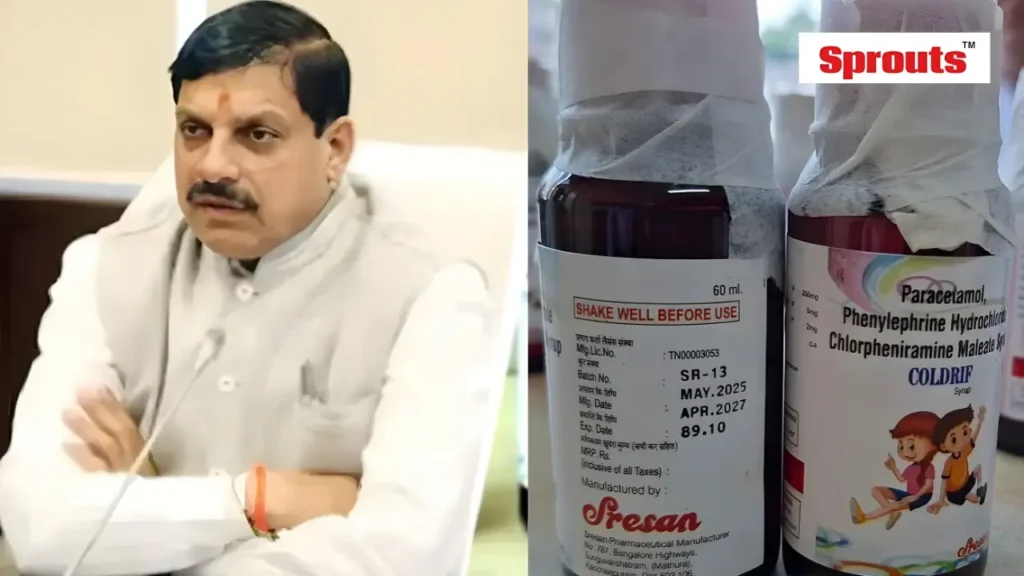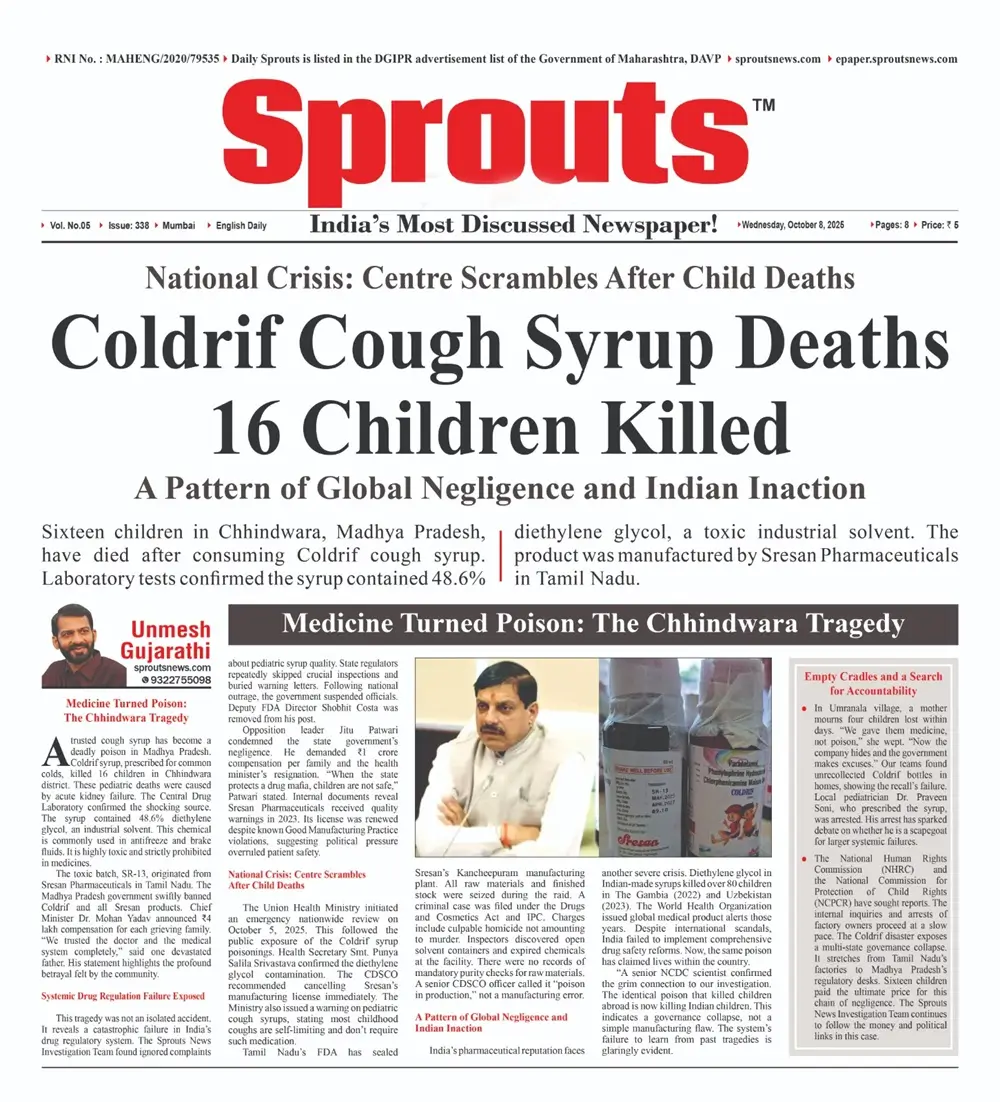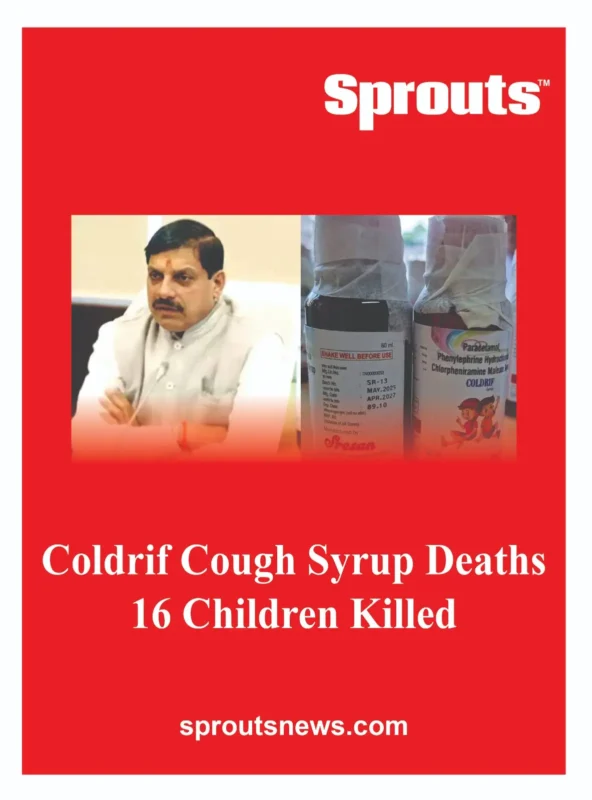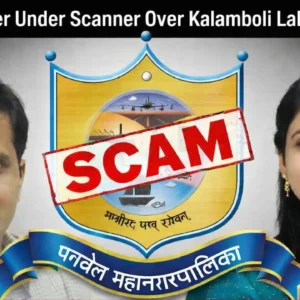Coldrif Cough Syrup Deaths: 16 Children Killed by Toxic Diethylene Glycol in Madhya Pradesh
• National Crisis: Centre Scrambles After Child Deaths
• A Pattern of Global Negligence and Indian Inaction
• Medicine Turned Poison: The Chhindwara Tragedy
Sixteen children have died in Chhindwara, Madhya Pradesh, after consuming Coldrif cough syrup contaminated with 48.6% diethylene glycol—an industrial solvent used in antifreeze. Manufactured by Tamil Nadu-based Sresan Pharmaceuticals, the toxic batch has sparked national outrage and prompted a state-wide ban. Sprouts SIT’s findings reveal systemic negligence in India’s drug quality control that turned a common medicine into a deadly poison.
- Coldrif Cough Syrup Deaths: 16 Children Killed by Toxic Diethylene Glycol in Madhya Pradesh
- • National Crisis: Centre Scrambles After Child Deaths
- • A Pattern of Global Negligence and Indian Inaction
- • Medicine Turned Poison: The Chhindwara Tragedy
- Medicine Turned Poison: The Chhindwara Tragedy
- Systemic Drug Regulation Failure Exposed
- National Crisis: Centre Scrambles After Child Deaths
- A Pattern of Global Negligence and Indian Inaction
- Empty Cradles and a Search for Accountability
Click Here To Download the News Attachment
Medicine Turned Poison: The Chhindwara Tragedy
A trusted cough syrup has become a deadly poison in Madhya Pradesh. Coldrif syrup, prescribed for common colds, killed 16 children in Chhindwara district. These pediatric deaths were caused by acute kidney failure. The Central Drug Laboratory confirmed the shocking source. The syrup contained 48.6% diethylene glycol, an industrial solvent. This chemical is commonly used in antifreeze and brake fluids. It is highly toxic and strictly prohibited in medicines.
The toxic batch, SR-13, originated from Sresan Pharmaceuticals in Tamil Nadu. The Madhya Pradesh government swiftly banned Coldrif and all Sresan products. Chief Minister Dr. Mohan Yadav announced ₹4 lakh compensation for each grieving family. “We trusted the doctor and the medical system completely,” said one devastated father. His statement highlights the profound betrayal felt by the community.
Systemic Drug Regulation Failure Exposed
This tragedy was not an isolated accident. It reveals a catastrophic failure in India’s drug regulatory system. The Sprouts News Investigation Team found ignored complaints about pediatric syrup quality. State regulators repeatedly skipped crucial inspections and buried warning letters. Following national outrage, the government suspended officials. Deputy FDA Director Shobhit Costa was removed from his post.
Opposition leader Jitu Patwari condemned the state government’s negligence. He demanded ₹1 crore compensation per family and the health minister’s resignation. “When the state protects a drug mafia, children are not safe,” Patwari stated. Internal documents reveal Sresan Pharmaceuticals received quality warnings in 2023. Its license was renewed despite known Good Manufacturing Practice violations, suggesting political pressure overruled patient safety.
Also Read: Protesters Expose ₹100 Crore Fraud in Bhiwandi-Wada Highway Project.
National Crisis: Centre Scrambles After Child Deaths
The Union Health Ministry initiated an emergency nationwide review on October 5, 2025. This followed the public exposure of the Coldrif syrup poisonings. Health Secretary Smt. Punya Salila Srivastava confirmed the diethylene glycol contamination. The CDSCO recommended cancelling Sresan’s manufacturing license immediately. The Ministry also issued a warning on pediatric cough syrups, stating most childhood coughs are self-limiting and don’t require such medication.
Tamil Nadu’s FDA has sealed Sresan’s Kancheepuram manufacturing plant. All raw materials and finished stock were seized during the raid. A criminal case was filed under the Drugs and Cosmetics Act and IPC. Charges include culpable homicide not amounting to murder. Inspectors discovered open solvent containers and expired chemicals at the facility. There were no records of mandatory purity checks for raw materials. A senior CDSCO officer called it “poison in production,” not a manufacturing error.
A Pattern of Global Negligence and Indian Inaction
India’s pharmaceutical reputation faces another severe crisis. Diethylene glycol in Indian-made syrups killed over 80 children in The Gambia (2022) and Uzbekistan (2023). The World Health Organization issued global medical product alerts those years. Despite international scandals, India failed to implement comprehensive drug safety reforms. Now, the same poison has claimed lives within the country.
“A senior NCDC scientist confirmed the grim connection to our investigation. The identical poison that killed children abroad is now killing Indian children. This indicates a governance collapse, not a simple manufacturing flaw. The system’s failure to learn from past tragedies is glaringly evident.
Empty Cradles and a Search for Accountability
In Umranala village, a mother mourns four children lost within days. “We gave them medicine, not poison,” she wept. “Now the company hides and the government makes excuses.” Our teams found unrecollected Coldrif bottles in homes, showing the recall’s failure. Local pediatrician Dr. Praveen Soni, who prescribed the syrup, was arrested. His arrest has sparked debate on whether he is a scapegoat for larger systemic failures.
The National Human Rights Commission (NHRC) and the National Commission for Protection of Child Rights (NCPCR) have sought reports. The internal inquiries and arrests of factory owners proceed at a slow pace. The Coldrif disaster exposes a multi-state governance collapse. It stretches from Tamil Nadu’s factories to Madhya Pradesh’s regulatory desks. Sixteen children paid the ultimate price for this chain of negligence. The Sprouts News Investigation Team continues to follow the money and political links in this case.



















